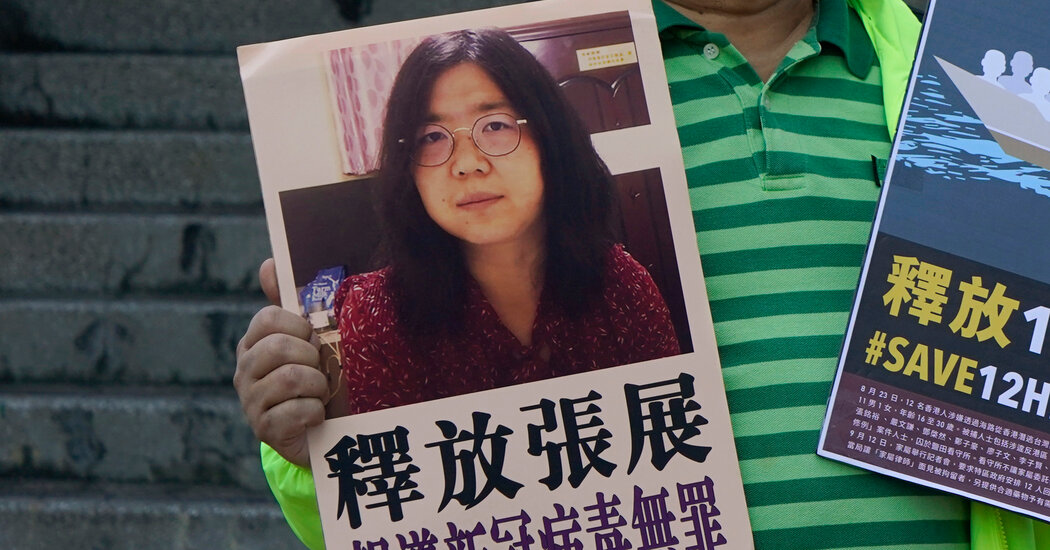Zhang Zhan, thought to be the first person in China imprisoned for documenting the early days of the coronavirus pandemic in the country, was expected to be released on Monday, after serving a four-year sentence.
But in a sign of how eager the Chinese government remains to suppress public discussion of the outbreak, it was unclear on Monday evening whether Ms. Zhang, 40, had actually been set free. The lawyer who represented Ms. Zhang during her trial, Zhang Keke (the two are not related) said he could not reach her mother all day. Reached by phone, officials at the Shanghai prison administration declined to comment.
“Even though she will have served her sentence, there are doubts regarding the Chinese regime’s willingness to give her back her freedom,” Reporters Without Borders, the international media watchdog group, said in a statement several days before her expected release. The group, which gave Ms. Zhang a press freedom award in 2021, noted that journalists released from imprisonment in China are often kept under surveillance.
Ms. Zhang was an early symbol of the mistrust that many Chinese harbored toward the government’s handling of the outset of the pandemic, and the hunger they had for unfiltered information. A former lawyer from Shanghai, she traveled in early 2020 to Wuhan, the city where the virus was first detected, as a self-styled citizen journalist.
For months, she filmed amateur, often shaky videos that contradicted the government’s narrative of a smooth, triumphant response to the crisis. She visited a crematory and a crowded hospital, where rolling beds lined the hallway. She recorded the city’s empty train station and tried to interview residents about the lockdown, though many brushed her off or requested anonymity, seemingly out of fear of reprisals.
She had never done any reporting before, friends said at the time, but she was motivated by her Christian faith and a sense of outrage at the government’s one-sided narrative.
“If we just wallow in our sadness and don’t do something to change this reality, then our emotions are cheap,” Ms. Zhang said in one video.
The government, busy trying to contain infections and maintain the lockdown of the city of 11 million, for a time let a small measure of independent reporting on the outbreak slip through. Some of Ms. Zhang’s videos that she posted to Chinese social media were censored, but she also uploaded them to YouTube, which is banned in China.
But before long, the crackdown on independent reporting began in earnest. Other citizen journalists started disappearing. Ms. Zhang acknowledged the risks but kept posting — about the lockdown, and then, after it was lifted in April 2020, its aftermath. Then, that May, she was arrested and brought back to Shanghai.
Still, even in detention, Ms. Zhang remained defiant. She began several prolonged hunger strikes, according to her lawyers, and grew so weak that used a wheelchair to appear at her trial. The authorities force-fed her through a feeding tube, her lawyers said.
Ms. Zhang was sentenced in December 2020 to four years in prison, on the charge of “picking quarrels and provoking trouble,” a catchall offense the government frequently uses to silence critics.
Ms. Zhang’s plight quickly became a rallying cry for human rights activists and foreign governments critical of China’s suppression of free speech. When news emerged in 2021 that Ms. Zhang was severely ill, the U.S. State Department called for her immediate release, as did groups such as Human Rights Watch.
But many who tried to advocate for Ms. Zhang from within China seemed to become targets themselves. Her brother, who had used Twitter, which is banned in China, to share childhood memories and rally international support for her, largely went silent. Many of his posts were later deleted. One of the lawyers who represented her has been barred from practicing law for his involvement in a different human rights case.
Asked about Ms. Zhang’s case at a regularly scheduled news briefing on Monday, a spokesman for the Chinese foreign ministry said that he did not have information about her case, but that anyone who violated Chinese law should be punished.
In Ms. Zhang’s last video from Wuhan, where she described chatting with some out-of-work migrant workers, she pondered the usefulness of what she was doing.
“Actually, today I was very unsure what to say,” she said. “But these people, these things always push me to keep moving forward from hopelessness and fear, to keep paying attention to them and speaking for them just a little.”














































